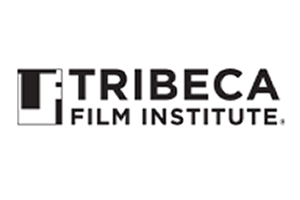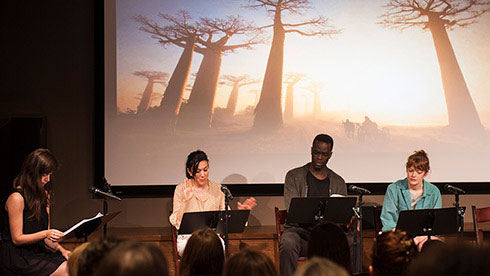At Tribeca Film Institute, a Treasure Trove for Indie and Emerging Filmmakers
Written by: Christopher Llewellyn Reed | October 3rd, 2016

In Lower Manhattan, bordered on the west by the Hudson River, the east by Broadway, the north by Canal Street, and on the south by the World Trade Center site, lies the neighborhood known as Tribeca (formerly spelled “TriBeCa,” each syllable formed, as a portmanteau, from the words “triangle below Canal”). Given its extreme proximity to the horrors visited upon New York City on September 11, 2001, one need not expend much energy imagining what life must have been like there in the days, weeks and months after the terrorist attacks. Fire and brimstone, indeed. Small wonder, then, that three souls connected to the area might choose to do something to revive its fortunes. And so, in 2002, actor Robert De Niro and producer Jane Rosenthal – who had together formed Tribeca Productions, a studio responsible for A Bronx Tale and Wag the Dog, among many other projects, in 1989 – co-founded, along with real-estate investor Craig Hatkoff, the Tribeca Film Festival. Now set for its 16th iteration in April, 2017 (April 19-30, to be exact), the since-annual event has become one of the hottest tickets of the spring festival circuit. Mission accomplished. Except that the philanthropic aspirations of the festival’s originators did not stop there.

Before long, the festival’s rapid success caught up with it, and so in 2004 the organization formed a separate LLC to run the ever expanding Tribeca Film Festival and allowed TFI to continue focusing on its nonprofit work with filmmakers. Anne Becker, Senior Director of Marketing, Partnerships & Communications at Tribeca Film Institute (TFI), explains: “TFI went on to expand from its earlier grant programs, such as Tribeca All Access (TAA), into a robust nonprofit entity, including several grants for scripted, documentary and interactive storytellers as well as a full slate of film-based education programs for students.” In other words, all you aspiring – and even established – filmmakers out there, there’s funding to be distributed from that magic triangle in the southwest corner of America’s financial capital, as long as you are willing to apply for it and have an original idea worth funding.
Whence the monies? Anne Becker continues: “Our funding comes from a variety of sources, including the government (e.g., National Endowment for the Arts (NEA); New York State Council for the Arts (NYSCA); New York Department of Cultural Affairs (NYDCA); other institutions (e.g.,Time Warner Foundation, Alfred P. Sloan Foundation), assorted corporations (e.g., Gucci) and individuals.” But that’s less important than how the funds are distributed, to whom, and why. So get ready to read carefully, because there’s not only indie-filmmaking treasure to be mined, but a treasure trove of diverse opportunities.
I recently had the chance to chat with Amy Hobby, VP of Artist Programs at Tribeca Film Institute, about the many grants administered by her organization. She spoke with enormous enthusiasm about TFI’s role in helping artists with ideas both fully developed and not yet fleshed out. What follows is a condensed version of that conversation, edited for clarity.
Film Festival Today: As part of its mission, TFI offers many funds available to up-and-coming filmmakers and new-media artists. What are some of those grants, and what is the range of financial awards?
Amy Hobby: At TFI, we try to change who is telling the stories in our culture. We’re trying to change the dominant narrative, we mentor and give grants through various programs. A lot of people say, “Oh, well, if you give my film a grant, do I have to premiere at the Tribeca Film Festival?” That is not true. Of course, we would love all of our grantees to premiere at the Tribeca Film Festival, but that is not a requirement. We’re not attached in that way. We look to help filmmakers find the best film strategy, including festival-distribution strategies, for their films.

There’s a wide range of awards, from $1200 travel stipends to come to a network session at our festival up to, potentially, $50,000 through our Gucci Tribeca Documentary Fund, depending on how the jury allocates to the winners. So it’s quite a wide range of financial support. With all of our films … anyone who gets financial support also gets access to our team, mentorship. We connect our filmmakers with other people in the industry. We have two awards that are administered through universities. One is our ESPN Future Filmmaker Prize and the other is our Sloan Student Grand Jury Prize, for films that involve science and technology. Scripted films. So we work with universities on those two funds.
Our flagship fund – the core spine of all that we do – is called Tribeca All Access. We look to find filmmakers who come from under-represented communities. There are 10 main awards: we do 5 scripted and 5 docs. Each filmmaker gets $10,000, in addition to a travel stipend, if needed, to come to the Festival and its network sessions – which they are required to come to, because these are, typically, emerging filmmakers. These are projects that are in progress. These can be very early stages … development … RD [research and development] and production … the program is intended for emerging filmmakers, very specifically.
And it ranges all the way up to our TFI Documentary Fund, and TFI New Media Fund, which include more experienced filmmakers. One recent film that got awarded was Weiner. We came on that film very early, with a grant, like 2 years ago, and then they applied again, for our Doc Fund, and we ended up granting them again. We’ve been working with the filmmakers over the course of those two years, supporting them, mentoring them, giving them advice whenever they needed it, looking at footage, and when they came in for the grant, they needed that bit of post-production funding to make it to their premiere at Sundance, and we assisted with that. That’s also an example of our open-mindedness with regards to the Tribeca Film Festival. (laughs) We would have loved to have that film premiere at the Tribeca Film Festival, but that’s not what was right for the film. We also granted the film Tower, which premiered at SXSW. You know, it was a Texas-based filmmaker, so it made the most sense for the film to premiere there.
FFT: Understood. So for Weiner, at what point did they come to you for funding? You mentioned giving them the post-production funds, so did they come to you with a rough cut, or were you there from the start of production?
AH: We saw the film two years ago, when it was very early days. They submitted selects from footage, We had been tracking that film for a long time. We like to support filmmakers and not necessarily just the one project. So if there’s a filmmaker we’re supporting, we continue to support them, hopefully throughout their career. We welcome people to come back, with the same project two years later, or with a different project. If you’ve completed a project and it’s been successful, or maybe it didn’t even get completed, we welcome you to come back because we’re really looking to support people as much as projects.
FFT: Got it. To go back just a second. You mentioned the Sloan Student Filmmaker Fund, but there’s also the Sloan Filmmaker Fund [no student]. Can you explain the difference? I assume that students could still apply to the larger fund, but what is the difference in terms of awards, and what they’re looking for?
AH: So the Sloan Student Grand Jury Prize … Sloan teams up to administer a prize on top of prizes that are already being awarded at 5 or 6 universities. So Sloan is already working with NYU and 4 other universities to give a Sloan Student Prize at each of those universities. Each of those awarded filmmakers then come to us for a Grand Prize – the Sloan Student Grand Jury Prize – and that’s how that fund works. The TFI Sloan [no student] Filmmaker Fund is separate from that. Students aren’t eligible. It’s a scripted project that is in development, there’s a screenplay already and there’s a portrayal of science or scientists in the film. We just opened up that fund to television – television pilots – and we’re holding our first ever pilot workshop, with Sloan, this November, which is pretty exciting.
FFT: So, just to clarify, then: the Sloan Student Grand Jury Prize is only for students at those five particular schools that already have the Sloan Prize. Is that correct?
AH: Correct.
FFT: So what kinds of projects actually receive funding? The applications indicate that they are open to ideas in all stages of development, but then also have spots where one can attach directors and other talent, as well as link to related work, from either the applicant or some of that related talent, which may intimidate a first-time applicant, who may nevertheless have a kick-ass idea. How underdeveloped can the applications be? Who, in other words, should apply? I’m sure you’re going to say “everybody,” but realistically, what are you looking for when you’re looking at these applications?
AH: This is interesting, because this is something that I think makes Tribeca really unique, which is that we are looking for the really great filmmakers – and yes, everyone should apply – great filmmakers, great stories, great ideas, and we recognize that sometimes … and also because I come from a producing and filmmaking background … the best storyteller and filmmaker and media artist might not be the application-maker. Those skills aren’t necessarily one and the same. So one thing we’ve been working really hard to do, particularly in the past year, is to do a ton of outreach. For example, the head of the Doc Program, Jose Rodriguez, and I are going to Women Make Movies and we’re just going to talk for an hour about what makes a good application. How do you answer “what is an artist’s statement?,” for instance.
We do this all over Latin America – we have the TFI Latin America Fund – and we run workshops on how to best pitch a project or talk about your project to an international market place. We found that in Latin America, in particular, there’s a need for help with the application and presentation. People were like, “I didn’t know how to fill out the application and so I didn’t do it.” Well, your story and your film are really important, so you should try. And we tell people, “Look, if you’re confused about something in the application, call us on the phone.” We take calls, for better or worse. I’m on the phone some days, all day, to guide and encourage people.
And if we see some little gem in the application … this is a great idea and this filmmaker is potentially interesting, but I have no idea what they’re talking about, or they put together this budget that makes no sense … we ask for an idea of the budget in the application. We’ll reach out to that filmmaker and talk to them. We want to encourage emerging filmmakers, and find new voices. This is something that we take very seriously and have put a great amount of effort into. So we do want as many people as possible to apply, and we do offer help and guidance in those applications. So if you said, “Come to our university. Let’s schedule a time. Will you come down and talk about your funds and how to apply?” We’ll do it! (laughs) Because we’re crazy like that!
FFT: So the Fall 2016 Fund Applications opened on September 6 and close on November 6. Will there be a new round of spring applications, or is it just in the fall?
AH: Each application has its own timeframe but most of our funds do open in the fall. But also, in the spirit of what I was just saying, if someone says, “Look, I need until December 10 to get my materials together,” we’re pretty OK about that.
[And now, the conversation continues with the aforementioned Anne Becker, Senior Director of Marketing, Partnerships & Communications.]
FFT: So there is someone named Vee Bravo, who is the VP of Education. Amy Hobby is the VP of Artist Programs. Who oversees which funds?
Anne Becker: So Vee works with elementary, middle and high-school students. We run in-school and after-school programs where we actually train working filmmakers to go into the classrooms and serve as teaching artists for students. He also runs a restorative justice program where we screen and discuss films in prison. So he doesn’t oversee funds that would be open to professional filmmakers to apply for, but he does work with professional filmmakers in the capacity that he trains them to go in the classroom and teach filmmaking and media literacy to young students.
We do have a third program head, who is Opeyemi Olukemi, Senior Director of Interactive Programming, and she manages some grants, for interactive storytellersOne of them is the TFI New Media Fund, which recently opened, as well, and two prototyping funds. All the information is on the website. She also programs workshops, hackathons and other events for interactive storytellers during the festival and throughout the year – people who make projects in mediums like VR [virtual reality], AR [augmented reality], and all kinds of new ways of storytelling. She is responsible for certain grants. And then Amy’s department is responsible for all grants for doc and scripted filmmakers.

FFT: So, in Vee’s case, these workshops that are done in elementary, middle and high schools, are they then for schools that don’t already offer media literacy and media production, or is it sometimes as a supplement? Does the program exist to go into underserved communities to teach students how to tell their stories?
AB: Yes. It’s designed to target underserved communities. We do have a program called Tribeca Film Fellows that is for rising high school juniors and seniors, and that’s mostly underserved communities, but we have taken care to mix in some students who do attend private schools so that they can kind of learn from one another. But it’s mostly for underserved communities, and we work hand in hand with the schools to program based on their needs. He is also doing increasingly extensive work in prisons, mostly in New York, but he’s looking to expand that program over the next year. In addition to Otisville Correctional Facility, most of his work has been centered on Rikers Island. He’s worked with young high-school students there and pairs them with students at The Young Women’s Leadership School here, in Astoria, in Queens.
FFT: Wow! Whether it’s offering funds to filmmakers in need or teaching young people how to tell their stories with moving-image media, TFI is doing some amazing work. Thanks to you and Amy for talking with me!
AH: My pleasure!
AB: Thank you!
So that’s it, folks. If any of the available funds sound like they could be a great fit for you – or if you want to help out on TFI’s education side – don’t wait! Contact them now through the links provided in the article. Don’t let the treasure pass you by!


